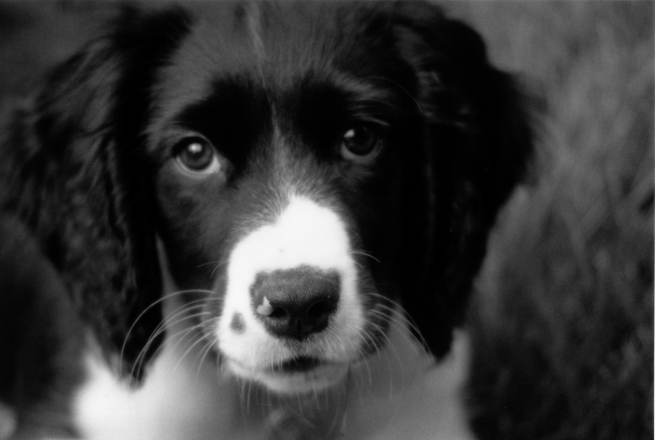I recently wrote a poem without thinking much about it, which seems to be one good way to write a poem. If it’s there, and coming into being, why think about it? Just get it down. I thought about it afterward, though.

Two Middle-aged Springer Spaniels
Two middle-aged springer spaniels,
black and white, with distinguished black freckles on the muzzle, and
one puppy, barely ambulatory, brown and white, slithered through the open screen door
when no one was looking, and charged into the living room. This room was in St. Louis, Missouri,
birthplace of T.S. Eliot and Marianne Moore, and it was large and full of comfortable
furniture. There were some nice-looking worn rugs on the floor, and the two elder dogs
ran around and around on the rugs, crumpling them up. They didn’t bark one bark,
but hurled themselves faster and faster in a circle around the room,
messing up the rugs completely and disassociating them from their rug pads. The dogs were
shedding all the while. Then they went over to the fireplace and upended the woodbox and the
kindling basket. They knocked down all the fire irons on the granite hearth with horrible noise.
The smallest was absorbing all the methods of the elder dogs, who seemed to
know this. They knocked over one of those fancy matchboxes with long matches
that people sometimes give you for visiting presents. Fortunately these didn’t ignite.
Then all three dogs were exhausted, so they crawled under the coffee table
and slept. This happened at my Aunt Deirdre and Uncle Leonard’s house in St. Louis,
and I know because I was there, too, and the thing I liked best about the whole performance
was that Aunt Deirdre and Uncle Leonard sat on the sofa and laughed and laughed the whole time,
and they didn’t tell the dogs to stop or call them bad dog or smack them,
and pretty soon the dogs went outdoors again and ran off into the bushes and down to the garage.
I have neither an Aunt Deirdre nor an Uncle Leonard, and I’ve never been to St. Louis. But I had an aunt and uncle who were similar to them, and they were lovely, forgiving people who knew what their dogs were like, and who loved their animals’ happiness more than a swept and garnished house.
My aunt was able to understand dog values and dog time. She knew that the importance of dog life lay in the chase, and in the curves of the arcs described around the living room, dining room, pantry, kitchen, back storeroom, were important parts of her dogs’ communication with the world and with each other. My aunt knew that the outdoors had a corresponding resonance for her dogs. The dog drama was to cover the ground in a ritual pattern, day and night, and to lead other dogs in the pattern.
My uncle came from a family who thought it was pretentious and hypocritical to have fancy boxes of fireplace matches with pictures of Piazza San Marco on them. I liked to go and stay with them by myself when I was a teenager, because they never seemed to be annoyed with me, unlike some. Could they possibly be in sympathy with people, as well as with dogs? Could they be sensible grownups who didn’t mind who or what you were, but who liked and/or loved you anyway? Would this show me how to laugh at things instead of be randomly angry? I was trying to find out who I was and what to do with my life. My aunt and uncle didn’t seem to mind if I stayed with them sometimes while I figured this out. I think I was lucky to have them.